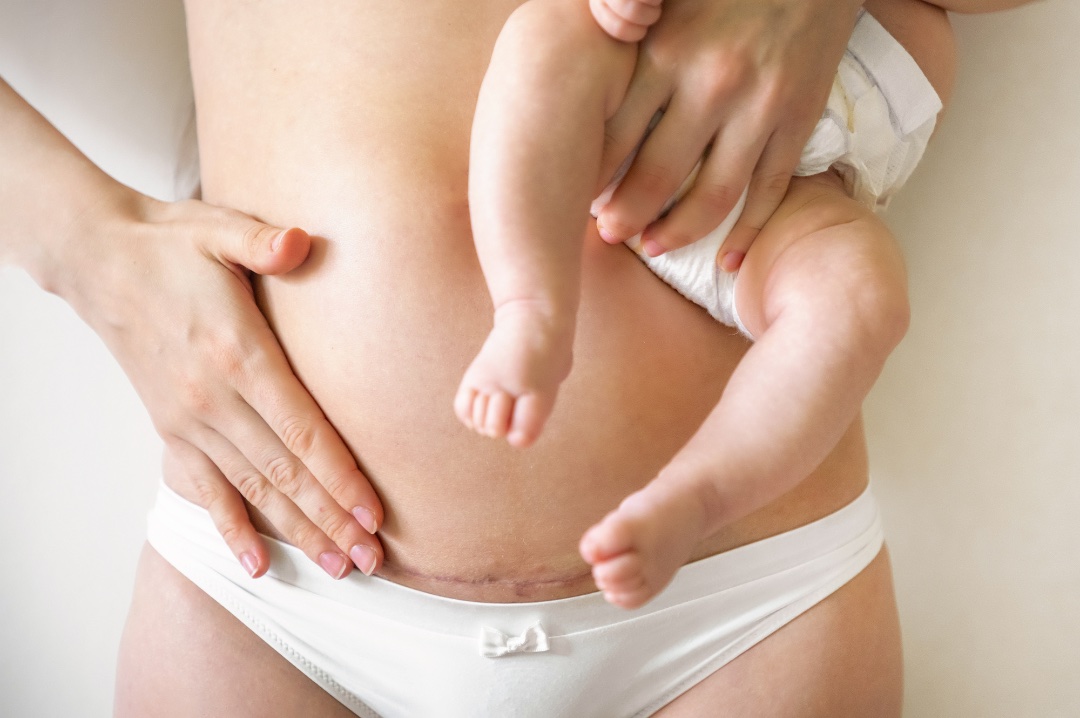Whether you’re finding yourself faced with an unexpected emergency cesarean section or a scheduled C-section, one thing stays the same: The healing process is no walk on the beach. Not only is your body recovering from major abdominal surgery, but you’re caring for a newborn around the clock and, in some cases, adjusting to nursing on top of everything else.
Nearly one-third of all live births are cesarean deliveries. The reasons for this are aplenty, many of which are outlined here. But what about the recovery? What steps can a mama take to care for her healing incision, manage pain, and gradually resume daily activities? Here are a few tips that can help speed up the healing process so you can spend less time dealing with aches and pains — and more time bonding with your new baby.
Get adequate rest.
For starters, you will likely spend anywhere from two to four days in the hospital with your new bundle of joy as you recover. We’ve said it once, and we’ll say it again — a C-section is a major surgery and your body needs proper time to heal (approximately 6 to 8 weeks). If loved ones can help you with daily tasks, housework, meals, and routine baby care, let them. Rest your body when your baby sleeps.
Be gentle with your body.
Take extra care getting around. For the first couple of weeks, don’t lift anything heavier than 10 to 15 pounds — or truthfully, don’t lift anything heavier than your sweet new baby. Avoid going up and down flights of stairs, and keep any supplies you need (for you or baby) nearby so you don’t have to get up as much. If you feel a cough, sneeze, or laugh coming on, support your abdomen to protect the incision. A postpartum binder can also provide additional support. Avoid strenuous exercises for sure, but gentle walks are always an excellent idea. Walking can foster healing, prevent constipation, and reduce the risk of blood clots. Heed your doctor’s advice on when it is clear to do things like driving, exercising, and having intercourse.
Manage pain as needed.
Definitely don’t suffer through it! Follow your physician’s directions regarding pain medications. Your doctor may prescribe a pain reliever or suggest over-the-counter medicine such as ibuprofen (Advil, Motrin) or acetaminophen (Tylenol). Most pain relief medications are safe to take while breastfeeding but always consult your doctor. You can also use a heating pad or a warm washcloth to relieve discomfort surrounding the surgical site.
Keep an eye out for any issues or signs of infection.
Routinely check your C-section incision for signs of infection. Contact your healthcare provider if your wound appears red or swollen, is hot to the touch, or is leaking fluid — or if you get a fever or the area around the wound changes color. You also don’t want to develop blood clots in the leg(s), which is why slow, gentle walks are important.
Manage postpartum changes over time.
Even after your baby is brought into the world, your body will continue to undergo some changes. Vaginal bleeding and cramping in the abdomen post-surgery are normal, as are other changes you may experience such as sore breasts, skin changes, night sweats, vaginal dryness, diastasis recti (separation of the abdominal muscles), and headaches. Postpartum exercises or physical therapy for diastasis recti can be beneficial, in addition to OTC pain medications for headaches, lubricants for vaginal dryness, and lightweight pajamas for night sweats.
Monitor your mental health.
Mental health can be just as important as the physical. While many women experience “the baby blues,” postpartum depression can interfere with a woman’s ability to care both for herself and her family. Childbirth and C-section recovery can trigger a plethora of feelings, so keep an eye out for mood changes, and seek help when needed. Postpartum support programs such as The Motherhood Space at Baptist Health Jacksonville can be hugely beneficial!
Attend any scheduled postpartum checkups.
See your healthcare provider about six weeks after delivery for a physical (and mental!) checkup. Your doctor will check your stomach, vagina, cervix, and uterus to see how well you’re healing, in addition to discuss your emotional well-being and answer any questions you may have.
Contact Beaches OBGYN at (904) 241-9775 for more information or to schedule an appointment.


